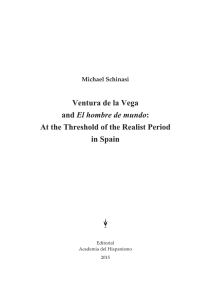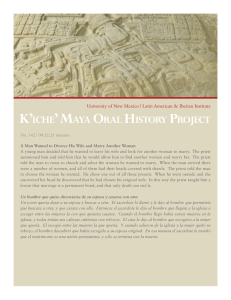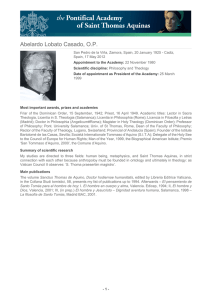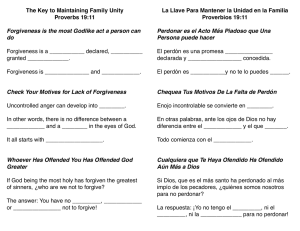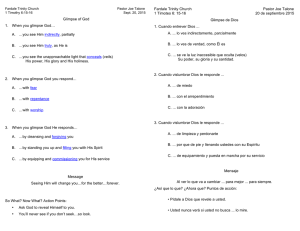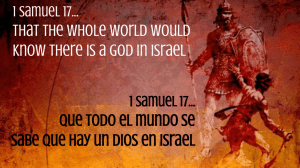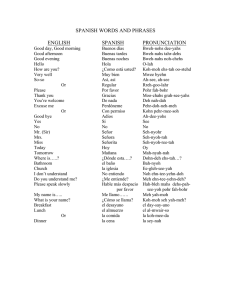What does it mean to say that man was created “in God`s image
Anuncio
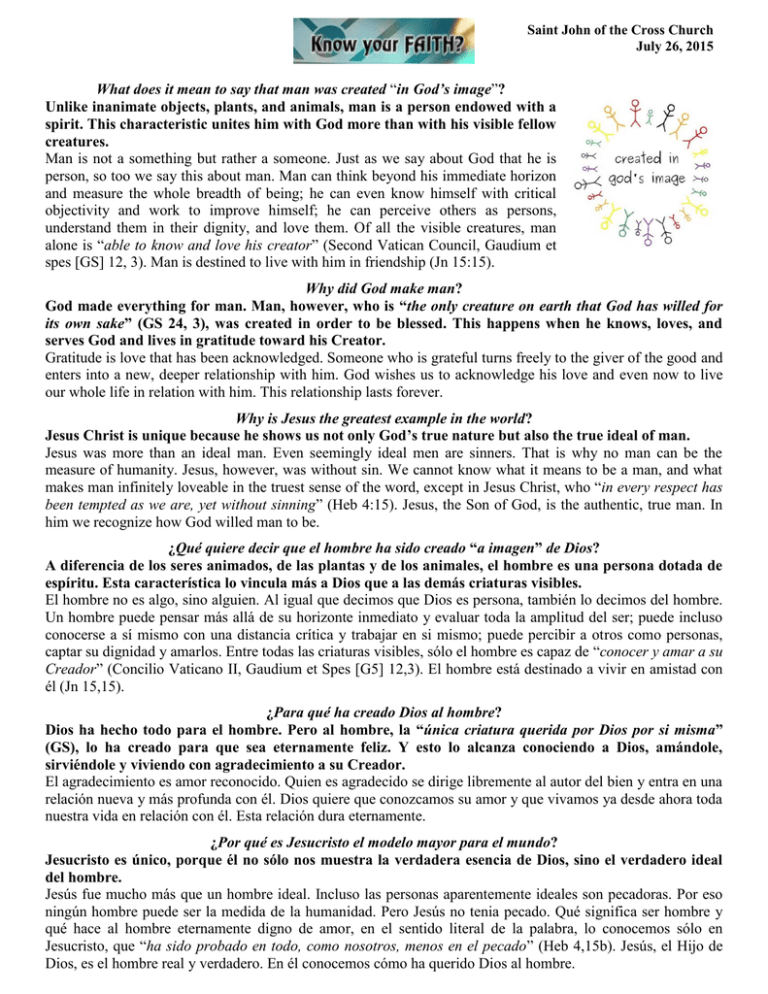
Saint John of the Cross Church July 26, 2015 What does it mean to say that man was created “in God’s image”? Unlike inanimate objects, plants, and animals, man is a person endowed with a spirit. This characteristic unites him with God more than with his visible fellow creatures. Man is not a something but rather a someone. Just as we say about God that he is person, so too we say this about man. Man can think beyond his immediate horizon and measure the whole breadth of being; he can even know himself with critical objectivity and work to improve himself; he can perceive others as persons, understand them in their dignity, and love them. Of all the visible creatures, man alone is “able to know and love his creator” (Second Vatican Council, Gaudium et spes [GS] 12, 3). Man is destined to live with him in friendship (Jn 15:15). Why did God make man? God made everything for man. Man, however, who is “the only creature on earth that God has willed for its own sake” (GS 24, 3), was created in order to be blessed. This happens when he knows, loves, and serves God and lives in gratitude toward his Creator. Gratitude is love that has been acknowledged. Someone who is grateful turns freely to the giver of the good and enters into a new, deeper relationship with him. God wishes us to acknowledge his love and even now to live our whole life in relation with him. This relationship lasts forever. Why is Jesus the greatest example in the world? Jesus Christ is unique because he shows us not only God’s true nature but also the true ideal of man. Jesus was more than an ideal man. Even seemingly ideal men are sinners. That is why no man can be the measure of humanity. Jesus, however, was without sin. We cannot know what it means to be a man, and what makes man infinitely loveable in the truest sense of the word, except in Jesus Christ, who “in every respect has been tempted as we are, yet without sinning” (Heb 4:15). Jesus, the Son of God, is the authentic, true man. In him we recognize how God willed man to be. ¿Qué quiere decir que el hombre ha sido creado “a imagen” de Dios? A diferencia de los seres animados, de las plantas y de los animales, el hombre es una persona dotada de espíritu. Esta característica lo vincula más a Dios que a las demás criaturas visibles. El hombre no es algo, sino alguien. Al igual que decimos que Dios es persona, también lo decimos del hombre. Un hombre puede pensar más allá de su horizonte inmediato y evaluar toda la amplitud del ser; puede incluso conocerse a sí mismo con una distancia crítica y trabajar en si mismo; puede percibir a otros como personas, captar su dignidad y amarlos. Entre todas las criaturas visibles, sólo el hombre es capaz de “conocer y amar a su Creador” (Concilio Vaticano II, Gaudium et Spes [G5] 12,3). El hombre está destinado a vivir en amistad con él (Jn 15,15). ¿Para qué ha creado Dios al hombre? Dios ha hecho todo para el hombre. Pero al hombre, la “única criatura querida por Dios por si misma” (GS), lo ha creado para que sea eternamente feliz. Y esto lo alcanza conociendo a Dios, amándole, sirviéndole y viviendo con agradecimiento a su Creador. El agradecimiento es amor reconocido. Quien es agradecido se dirige libremente al autor del bien y entra en una relación nueva y más profunda con él. Dios quiere que conozcamos su amor y que vivamos ya desde ahora toda nuestra vida en relación con él. Esta relación dura eternamente. ¿Por qué es Jesucristo el modelo mayor para el mundo? Jesucristo es único, porque él no sólo nos muestra la verdadera esencia de Dios, sino el verdadero ideal del hombre. Jesús fue mucho más que un hombre ideal. Incluso las personas aparentemente ideales son pecadoras. Por eso ningún hombre puede ser la medida de la humanidad. Pero Jesús no tenia pecado. Qué significa ser hombre y qué hace al hombre eternamente digno de amor, en el sentido literal de la palabra, lo conocemos sólo en Jesucristo, que “ha sido probado en todo, como nosotros, menos en el pecado” (Heb 4,15b). Jesús, el Hijo de Dios, es el hombre real y verdadero. En él conocemos cómo ha querido Dios al hombre.
